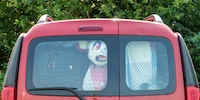
Background information
Everything’s better these days! Seven reasons why family driving holidays are becoming more and more enjoyable
by Michael Restin

No laughing children. No echo-distorted announcements. No Final Countdown. For four months, there was no funfair because of the coronavirus. For fairground owner Heinz Fries, business is slowly picking up again.
The boats rock on the sparkling waters of the lake. The streets seem immersed in torpor. The only lively spot is a small gravelled square on the harbour. There, an octopus spins in circles, clusters of screaming children clinging to its tentacles. Heinz is sitting in an air-conditioned cabin featuring a multicoloured underwater landscape complete with mermaids. He wears bright yellow sunglasses pulled up over his head and a gold chain with a bumper-car pendant around his neck. A relic from the past. "Go up on the left, go down on the right", he says in a voice slightly distorted by the loudspeaker. The funfair is back in Romanshorn, on Lake Constance.
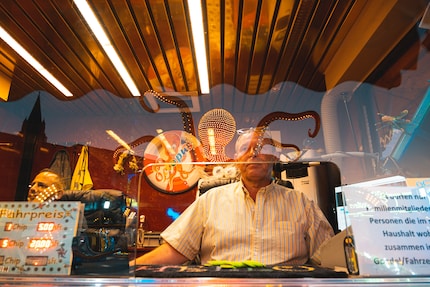
"We only have four rides here, but it's a start," explains Heinz Fries, who organises the funfair and has set up two of his rides. Bumper cars and an ice palace also await the public. The fact that they have been allowed to even turn on the lights is so far an isolated case in a year marked by the coronavirus pandemic. "In March, we went to the first event in Sion with weapons and luggage. Since then, most of the rides have been stored in the hangar. Now Heinz can at least do a few small fairs in Eastern Switzerland. Romanshorn, Frauenfeld, Kreuzlingen. In this region, the number of cases is low and the authorities were ready to give their authorisation after weeks of discussions, countless phone calls and a visit to the site. Most other fairgoers in other cantons are still waiting.
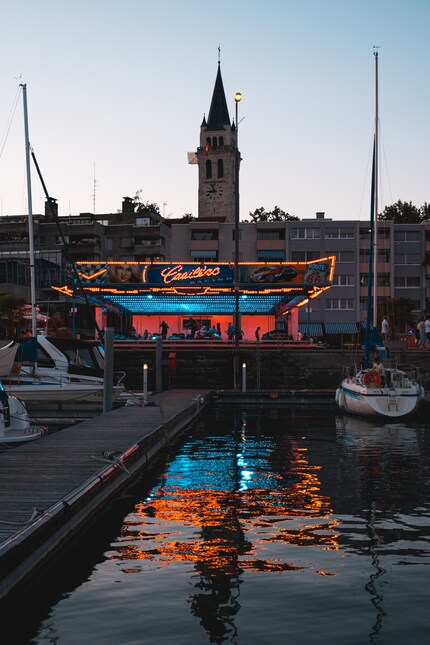
Nobody knows how to deal with the crisis, whether it's the showmen or the political class. A situation like this is unprecedented for everyone. "We fairground people have never stopped travelling during swine flu, even during the world wars," he says, "and now all of a sudden we're forced to take a break. All events are cancelled. There's no money coming in. The fairgoers are still waiting for support from the State. "Travellers are still stigmatised. And yet we fairground people are entrepreneurs, we pay our taxes and AHV like everyone else," explains Heinz, visibly frustrated. That's why their association recently organised a large rally on the Place Fédérale. "We want to show that we're still here."

Heinz can't imagine stopping working at funfairs. It's more of a vocation than a job. "I work almost non-stop from March to December, from early in the morning until late at night, all over Switzerland. In winter, I take care of the accounts, repairs and equipment replacement. February is my only month off. After thirty years in the business, he still gets a kick out of hearing the laughter of children when they take a turn on the octopus or one of his three other attractions. "I want children to be happy and families to forget their everyday lives for a few hours," he says, which is why he sold the bumper car track he had owned for years, which was particularly popular with young people. Since then he has concentrated on more family-friendly attractions such as carousels.
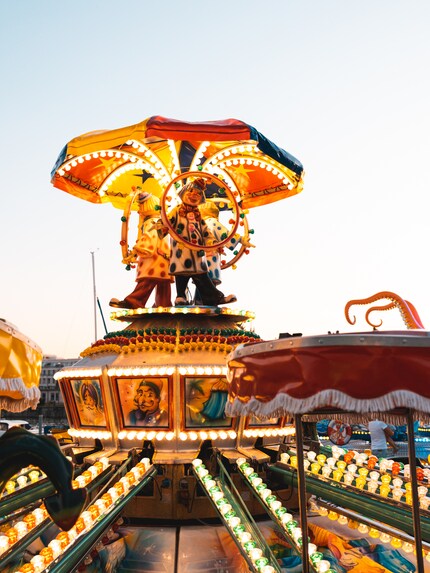
Heinz often has his own family around him. His wife, Ruth, runs the rides with him. Although his 25-year-old daughter has a job as a chemical laboratory technician as her main occupation, she regularly helps her parents on the weekend funfairs. "That's all she's ever known, that's how she grew up," says Ruth. It wasn't until she met Heinz that she walked through the door of the booth. "Ever since I was a little girl, I've loved funfairs. I used to save every penny I could to buy myself rides and sweets" So a true love story born at the funfair? "No, we met the classic way on the way out," laughs Ruth.
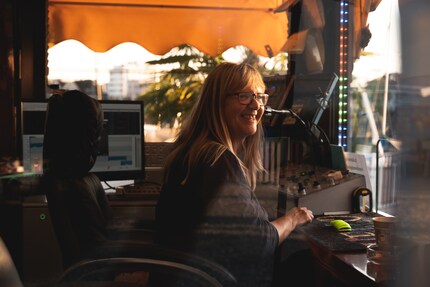
In the meantime, she has replaced Heinz at the till. She harangues the audience at the microphone. From time to time, she presses the buttons on her console. Ruth announces the final round with an extract from the song "Final Countdown". The next children are already waiting. Five francs entitles them to a blue token. One little boy likes it so much that, exceptionally, Ruth gives him one as a present. As he climbs up from the left, the purchased token is handed to Krzysztof, her assistant. From now on, not only does he help the children to board, he also gives them a few squirts of disinfectant in their hands. For the little ones, this is perfectly normal. They hold out their hands to Krzysztof before he even says anything.
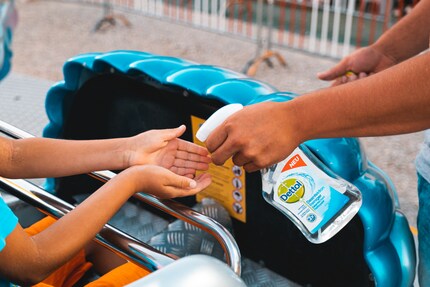
Disinfection is almost the only measure required by the authorities for authorisation. "The funfair is so small that it doesn't attract huge crowds as such. When we reach the capacity limit of around 300 people, we have grids that define the routes and divide people up into different zones", explains Heinz. Any swimming pool has more people in a smaller area. Many people, including politicians, associated the funfair with popular festivals such as the Olma or the Basel Autumn Fair, hence their highly critical attitude. "We just want to organise family events without the drinking and the stress. If nothing changes quickly, up to 60% of fairground workers could disappear next year, according to Heinz. "Some of them are already registered with the ORP or have other jobs."
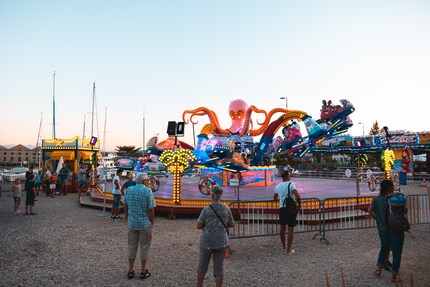
Heinz is not happy to be rid of his competitors - on the contrary. "We fairground people are one big family. Of course, we get on better with some people than others, but at the end of the day, we always stick together." Ruth is president of the Fairground Wives' Association and organises a big party for everyone every year. It's usually in December. We eat, drink and chat. For the children, there are little presents in the form of St Nicholas bags. "We all love this work, this life. It's what binds us together."
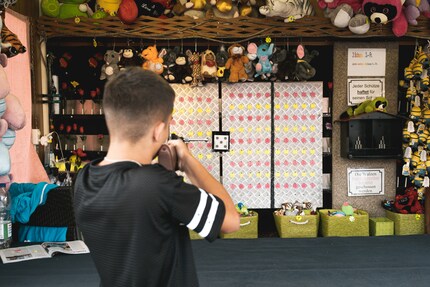
Heinz couldn't imagine any other life. "I couldn't work in an office. In the long term, being sedentary doesn't suit me. I miss my caravan. "Since the confinement began, Heinz and Ruth have stayed in their house in Kreuzlingen without interruption. For the first time in their lives. "We can't take it any more. After a while, the house has been cleaned ten times and there's no grass left to mow," explains Heinz. He wants to get out and bring people joy. Most of the fairgoers are in the same situation. Even his mother, aged 80, still sits in the booth from time to time to sell tokens. "Even though she stopped three years ago because of her back problems, she can't live without seeing the children's radiant faces. Without exchanging a few words with the adults. Without all that surrounding joie de vivre."
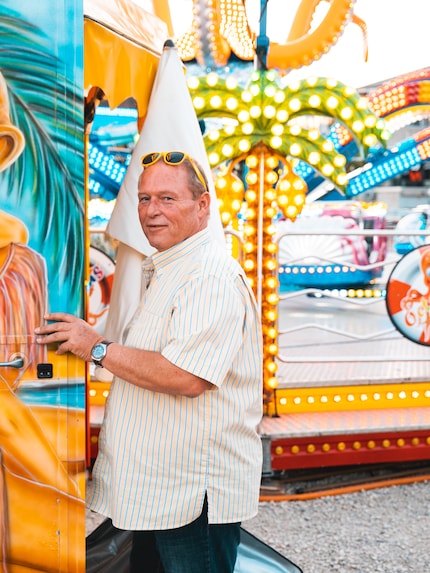
If this had been a normal year, Heinz and Ruth would have crossed the Engadine in June and then returned to eastern Switzerland for all the night parties around Lake Constance. Every year, he particularly looks forward to the festival in Arbon. "Our caravans are right by the lake. At five o'clock in the morning, I watch the sun rise over the water with a cup of coffee in my hand," he says. Otherwise, you're busy from morning to night. "Sleep takes a hit, but I can make up for it in winter," says Heinz.
Heinz sees nothing wrong with his nomadic life. "I know the whole of Switzerland, I always come to beautiful regions and I make contacts with people in the villages. "Over time, real bonds are forged. "At the Davos funfair years ago, a little boy who lived next door came to see us for the first time. Then he came back every year. I've seen him grow up, I saw him for the first time with a girlfriend. He's now married, has two children of his own and still calls me regularly on the phone". Bringing up his own daughter has also fitted in well with his life as a showman. When she was still little, she was always in the caravan. When she reached school age, she and her mother stayed in Kreuzlingen during the week. On Friday afternoons, Ruth would take her to the funfair where Heinz had been working for several days, and on Sundays she would return to Kreuzlingen. "Before, the children just went to school in the village where the funfair was held," says Heinz.
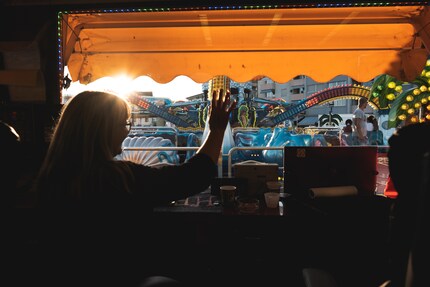
Today, rising costs are a headache for fairgoers. "Everything is billed separately: water, electricity, waste, pitch fees. Behind each expense is a different company, which of course wants to make money. On the other hand, the value of the funfair as a means of entertainment has declined. "It used to be the cinema and the funfair. But it's the weather that has always had the biggest impact on sales. If it rains, customers don't come. And if it's too hot, a lot of people won't come during the day either, as is the case today. You have to wait until the evening for the rides to fill up. "We drove twenty minutes to get here because we heard about the funfair on SRF. We wanted to offer our two daughters something special, especially now that we're at home most of the time," explains a father near the toddler carousel.

The atmosphere of the funfair is special. The many flashing lights, which only really come into their own after sunset, are almost too much for the eyes. The voices of the entertainers cheering on the crowd are lost in the echo. Their little phrases mingle with the samples. The clatter of air rifles can be heard in one corner, and fluorescent stuffed animals are proudly worn as trophies by the best marksmen. On the other side, the manager of the bumper cars sits nonchalantly in a car parked on the edge of the track. The children's faces are smeared with Italian-style ice cream. It's all fun and games. It's impossible to want to leave this atmosphere.
For the fairground people, one thing is clear: this must not be lost.
My life in a nutshell? On a quest to broaden my horizon. I love discovering and learning new skills and I see a chance to experience something new in everything – be it travelling, reading, cooking, movies or DIY.
Interesting facts about products, behind-the-scenes looks at manufacturers and deep-dives on interesting people.
Show all